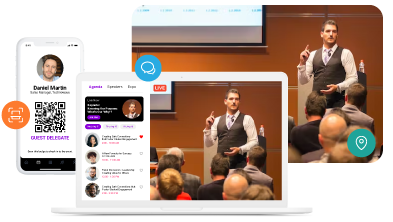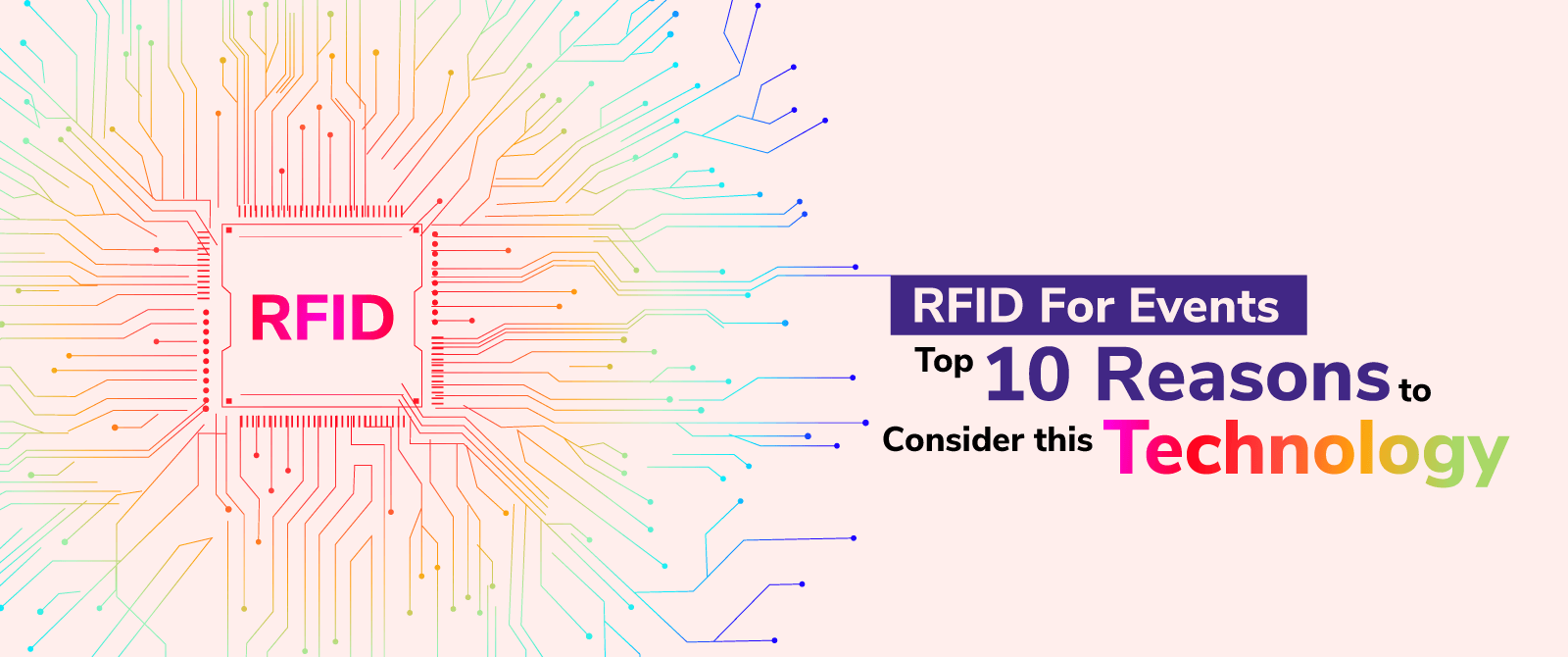Event organizers are constantly looking for new, creative ways to improve the guest experience, strengthen security and safety, streamline operations, and boost income since the events business is changing quickly. Radio Frequency Identification (RFID) is one innovation that is transforming the events business. Radio waves are used by RFID for events to identify and monitor people, animals, and other things. It has numerous applications in event management, including RFID ticketing, access control, inventory management, attendee engagement, and more. In this blog, we will explore the top 10 reasons why event planners should consider RFID technology. Before this, it’s important to first understand what RFID technology is and how it works.
What is RFID for Events and How Does It Work?
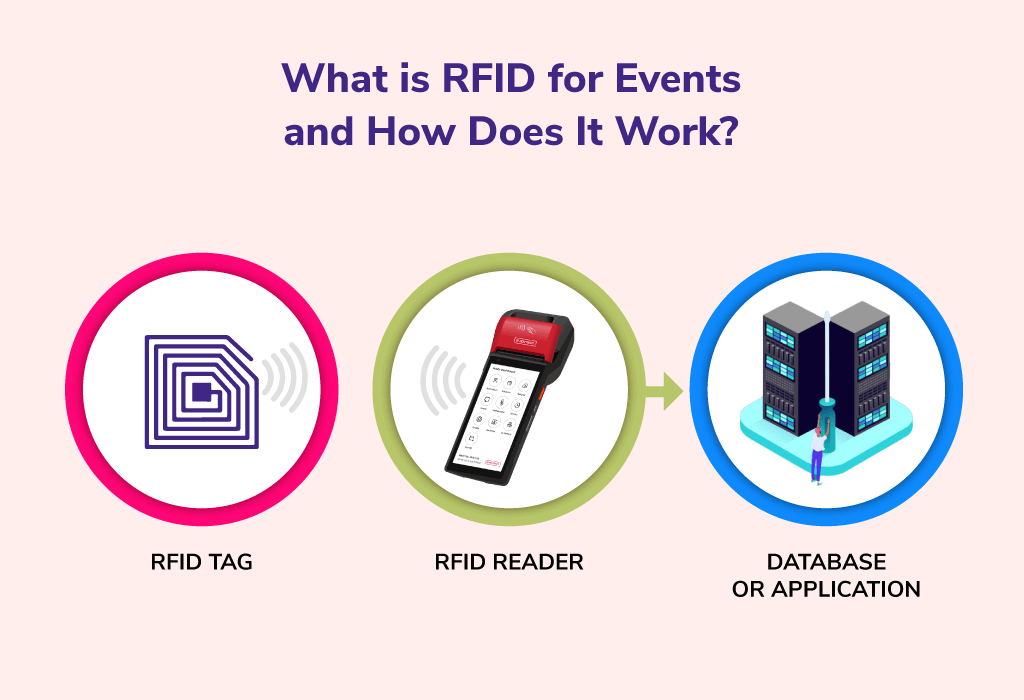
Radio Frequency Identification is a contactless data exchange method that uses radiofrequency electromagnetic radiation. RFID for events is utilized to track and automatically identify participants as they move about the space.
“In simple words, Radiofrequency Identification, sometimes known as RFID, is a contactless technology that utilizes radio waves to identify and track items and people”.
Three essential parts make up RFID technology for events: a tag, a reader, and a backend system. The tag has a microchip, and it may be worn or affixed to something. The tag is powered by the reader’s radio signal. It also enables the tag to communicate data back to the reader. After processing this data through the backend system, event planners are able to track attendance, control access to particular locations, and gather analytical insights.
RFID technology for events may be used for a number of things, including tickets, cashless transactions, and access control. For instance, guests may join the event, buy food and drink, and take part in interactive activities using RFID badges or wristbands. This can eliminate the need for physical tickets and cash, leading to a more efficient and streamlined event experience. RFID technology can also be applied to safety and security concerns. It may be used by event planners to track the movement of participants and employees, ensuring that only authorized people have access to restricted areas. RFID technology may also be used to find misplaced objects and individuals in busy places.
What Kinds of Events Can Utilize This RFID Event Management?
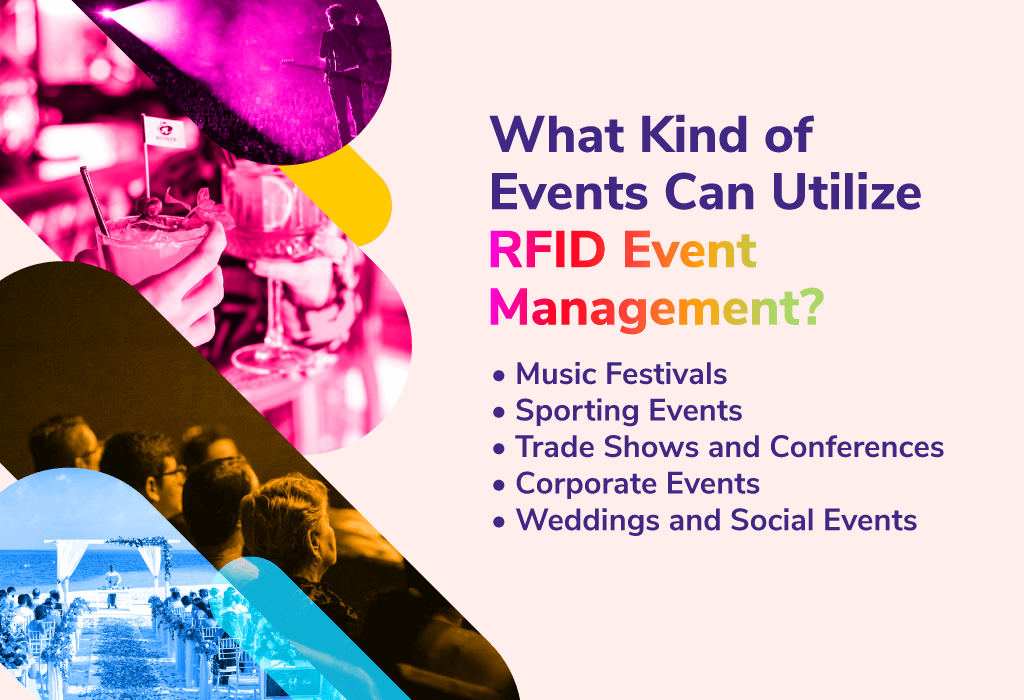
From little meetings to sizable festivals or conferences, RFID technology may be used in a variety of events. Following are some instances of events where RFID event management might be advantageous:
- Music Festivals: Music festivals can use RFID wristbands and RFID event badges for entry, cashless payments, and crowd control. Most event organizers use RFID For event ticketing. This can help streamline operations and reduce wait times for attendees.
- Sporting Events: RFID technology can be used for access control at sporting events. It ensures that only authorized individuals are allowed into restricted areas. It can also be used to monitor athlete movements and track performance data.
- Trade Shows and Conferences: RFID technology can be used for attendee tracking and analytics, allowing event organizers to gain insights into attendee behavior and preferences. It can also be used for lead retrieval and networking purposes.
- Corporate Events: RFID technology can be used for access control, registration, and crowd management at corporate events such as product launches, company parties, or team-building events.
- Weddings and Social Events: RFID technology can be used for guest check-in, seating arrangements, and cashless payments at weddings and other social events. This can help streamline operations and reduce wait times for guests.
Overall, RFID event management may be advantageous for any event that needs event ticketing, access control, or crowd management. Event planners may make their attendees’ experiences more effective, safe, and satisfying by utilizing this technology.
Top 10 Reasons to consider RFID for Events
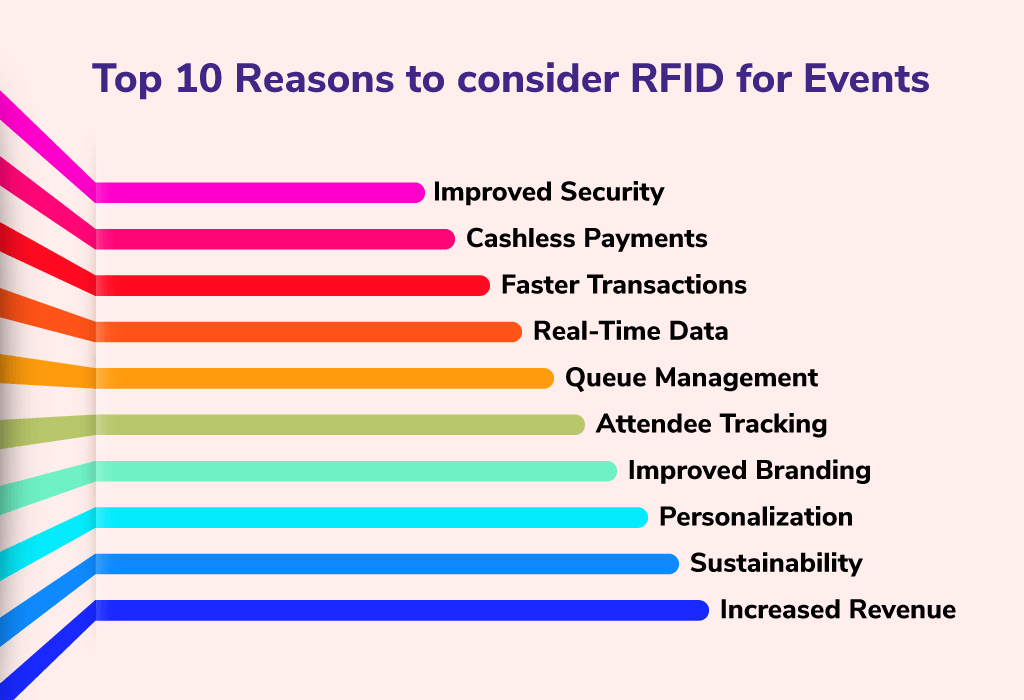
Improved Security
Radio waves are used by RFID technology for events to communicate between a reader and a tag, which is incorporated into wristbands, badges, or tickets. By using this technology, access may be controlled to ensure that only those with permission can enter restricted areas. By limiting illegal entry to VIP sections, backstage, or other sensitive areas, this can aid the event’s overall security.
Cashless Payments
RFID cashless payment systems can be used to facilitate cashless payments. It reduces the need for attendees to carry cash or credit cards. Attendees can load funds onto their RFID wristbands or badges, which can be used to make purchases at vendors or concessions. This can help reduce transaction times and simplify the payment process, making it more convenient for attendees.
Faster Transactions
RFID-based cashless transactions can speed up transaction times and cut down on attendance’ wait times. Attendees may have to wait in line to make a purchase using traditional payment methods, which can be tedious and time-consuming. Transactions may be handled more rapidly with RFID technology, allowing guests to return to enjoying the event.
Real-Time Data
Real-time data on visitor behavior, such as the most well-liked booths or activities, can be collected using this technique. This can assist event planners in making data-driven decisions to enhance the overall experience of the event. For instance, if a particular booth is seeing a lot of traffic, organizers may decide to focus additional resources there or change the event’s arrangement to better suit visitors’ needs.
Queue Management
Queue management and shorter wait times for guests are also possible by using RFID for events. For instance, the system may automatically modify the flow of people to maximize the efficiency of the line after assigning participants to different queues depending on the RFID tags they are wearing. This can shorten lines and enhance visitors’ overall satisfaction.
Attendee Tracking
The ability to identify attendee movements with RFID technology enables event planners to keep track of attendance and avoid overcrowding. For instance, if one area of the event is getting too crowded, organizers can send participants to other locations to ease congestion and ensure that everyone has a fun and safe time.
Improved Branding
RFID event badges and wristbands can be customized with logos or branding, helping to promote the event and increase brand awareness. Attendees can wear wristbands as a souvenir of the event, which can help spread the word and generate buzz for future events.
Personalization
It can be used to personalize the event experience for attendees, such as by suggesting activities or booths based on their interests. For example, if an attendee has expressed interest in a particular type of music, the system can recommend performances or activities that align with that preference. This can help attendees discover new experiences and maximize their enjoyment of the event.
Sustainability
RFID wristbands have less of an environmental effect than single-use tickets or badges since they may be used at several events. This may aid in reducing waste and promoting sustainability, which is something that many guests are starting to value more and more.
Increased Revenue
RFID-based cashless transactions can help event organizers generate more income. For instance, to encourage participants to spend more money at the event, suppliers may give special discounts or other incentives to those who have loaded a particular amount of money onto their RFID wristbands. This can assist event planners in maximizing their earnings and ensuring the event’s financial success.
Final words:-
The way events are organized and attended may be completely transformed by RFID technology. There are numerous benefits of RFID for Events. It may, for example, enhance safety and access control, boost audience engagement, speed check-in and registration procedures, allow for cashless transactions, raise sponsor and exhibitor ROI, offer real-time analytics, and do much more.
For event organizers, implementing RFID technology may be a game-changer. To choose which RFID solutions would be most helpful, it is crucial to carefully analyze the unique demands and objectives of each event. Finally, we advise event organizers to look into the possibilities of RFID technology and how it may help their events. By collaborating with RFID solution providers like Dreamcast, events may be made more effective, interesting, and profitable. So, don’t hesitate to incorporate this technology in your future events to offer a seamless and satisfying experience to your attendees. Contact us for more information and details.
FAQ:-
RFID technology for events can be made secure by using encryption and other security measures to protect the data stored on the tags and transmitted between the reader and the tag.
RFID technology can be limited by factors such as read range, interference from other radio signals, and cost. It may also require significant investment in infrastructure and training.
Some types of RFID tags can be reused, while others are designed for one-time use. Reusable tags can be erased and rewritten with new data.
RFID tags can be active (powered by a battery) or passive (powered by the radio waves from the reader). They can also be classified by frequency (low, high, ultra-high, or microwave) and read range (short, medium, or long).
Create an Extraordinary Event Experience
Across All Event Formats
